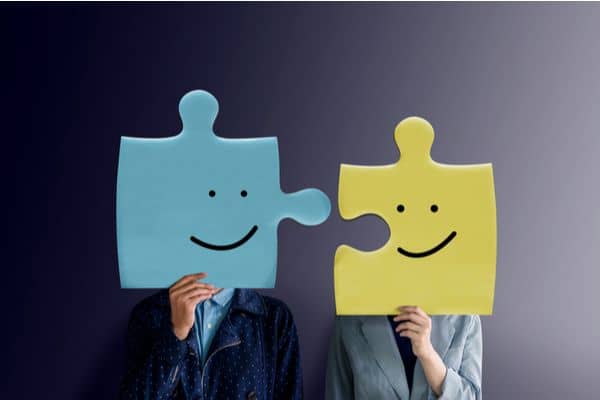A new relationship. You know the feeling. The butterflies, the nervousness, the exhilarating rush of all the firsts. There isn’t anything quite like it. In fact, falling in love with someone can sometimes feel like falling in love with life all over again. The sky looks brighter, the leaves on the trees appear greener. The energy of the universe seems to be rooting for you. It feels like you hit the lottery.
But did you?
Some time goes by. The butterflies settle down, they aren’t flying quite as often or as enthusiastically. There are no more firsts. The glow that had surrounded life starts to fade, only slightly. The sky looks like the sky, the leaves look like leaves, and the universe is just the universe. How had you seen things so differently before? How come everything looks different again now?
The very fact that entering a relationship can affect your vision of the world around you speaks towards something very real that often happens. A relationship can change how you see yourself.

Can You See Something Different About Yourself?
When you’re in love with someone, do you ever look in the mirror and like what you see? Do you like what you see more than before? Do you feel more attractive, more desirable, and, frankly, quite beautiful?
On the other hand, when a relationship ends, does that same reflection suddenly become someone you don’t even want to look at anymore? Do you now look ugly or gross? Do you feel worthless?
If this is ringing any bells, you’re certainly not alone. Relationships can completely alter how you feel about yourself, how you see yourself, and your sense of identity.
How Relationships Affect Self-Image
According to a study in the Journal of Personality and Social Psychology, people who started a new romantic relationship in the first year of the study experienced a greater increase in self-esteem by the end of that year than those who stayed single. By the end of the second and third years, though, that had changed. People who had started a new romantic relationship no longer experienced higher self-esteem than the people who stayed single.
The study went on to assess the longevity of these relationships, and whether or not that played a part. Short relationships were considered to be ones that didn’t last for the entirety of the first year. These didn’t seem to impact people’s self-esteem one way or another. Their self-esteem remained the same as those people who had remained single. However, by the end of the second year, the people who had been in the short-lived relationship the year prior had lower self-esteem than those who remained single.
Another interesting aspect of entering a relationship, mentioned in the same study, is that it provides you with a new “role.” What kind of role? You are now someone’s partner, giving you a new label within society and within your social groups. This alone can provide a self-esteem boost. I’ve thought about this quite a bit. Indeed, when I first entered certain relationships, I felt a rush at just being someone’s girlfriend. It can be exciting, especially if you don’t often get involved in relationships often. It can also be exhilarating to those people who have had a lot of time pass since their previous relationship.
What Does This Mean?
It is more beneficial to your self-esteem to stay single than to enter a relationship that does not last long. The summary of the study, in the words of the author, was “…beginning a relationship improves self-esteem if and only if the relationship is well-functioning, stable, and holds at least for a certain period (in the present research…one year or longer).”
This information tells us something that we probably already know. Relationships that are healthy, solid, and long-lasting are the best for our emotional well-being and, subsequently, our self-image. We are supposed to know the relationship will be all of those things before we let ourselves fall in love? In theory, that would be great, but it is rarely ever so simple. Relationships can also sometimes blindside us, and things we thought were flings turn into a lifelong commitment. Is it possible to assess these situations in such an adept manner? Unless you’re psychic, I’m going to say no.

How Can We Self-Preserve?
Since we have no way of predicting the future with the accuracy needed to ensure no relationship-induced self-esteem hits take place, then the best we can do is work on our self-image on our own. Even if you’re currently with someone, you can grow and strengthen your own self-esteem separately. In other words, you can develop an additional relationship, one you can make sure will be healthy and withstand the test of time, one with yourself.
This is a lot easier said than done. Working on curating and maintaining a positive and well-conditioned concept of yourself is a process and one you may have to actively dedicate time towards for the rest of your life. But, oh, is it worth it.
Building A Positive Self-Image
The path to hearty self-esteem is not the same for everyone, and takes a certain amount of trial and error, as well as constant vigilance, even on days when you can barely stand to face your reflection in the mirror. It’s crucial, though, not just for your romantic relationships, but for all your interpersonal relationships and most of all, for yourself. There are entire books written on the subject, so I’ll just mention a few staples that have worked for me or others that I know.
Force Yourself to Be Conscious of Your Negative Thoughts About Yourself
- This is a sort of mindfulness that can help you look at what you’re feeling objective, instead of spiraling into a hole of self-hate. If you find yourself thinking, “I’m not good enough,” instead of latching on to that thought, try to separate yourself from it and approach it from the outside.
- Ask yourself why you think you’re not good enough? Is it because you feel ugly, dumb, or incapable? Why do you feel ugly, dumb, or incapable? Is it because you watched that show with the beautiful models in it? Why did that show cause those feelings? If you keep questioning your own negative thoughts, you soon start to think about them objectively, instead of feeling them emotionally.
- Once you can look at the things you do not like about yourself from an objective stance, you have control of your own flaws (whether self-perceived or not) and it’s much harder for a romantic partner or relationship to cause you to get down on yourself in regards to these shortcomings.
Get Into the Habit of Writing or Saying Nice Things to Yourself
- This sounds silly, but if you make yourself do this every single day, multiple times, it really does work. Stand in front of the mirror and say, “You are good enough,” “You are doing a great job,” “Every day, you are growing and evolving and it’s beautiful.” If speaking to yourself out loud feels too awkward, then write these sayings down on post-it notes or in a journal. Do it over and over again. These are called positive affirmations and they’re basically little love messages for yourself.
- If you do this long enough, these messages will stick in your brain, and before you know it, you’ll fully believe them. So even if a relationship ends, you still have someone who is in your corner, reminding you every day that you’re awesome. That person is you.

Make Time for Physical Activity and Your Own Independent Hobbies
- Physical activity is important from a scientific standpoint. Regular exercise neurologically makes you feel good; it directly affects your sense of well-being by stimulating brain activity and releasing endorphins, giving you a sense of calmness and happiness. You don’t have to lift weights every day in the gym, run marathons, or even break a sweat. Just taking walks a few times a week can help. Maybe a few jumping jacks in the morning to start your day. Any physical activity is better than none.
- It’s also important to take time out in order to focus on the things that you enjoy doing, that don’t necessarily involve your partner or your relationship. This could be reading, knitting, coloring, playing Animal Crossing, or doing puzzles. If you make sure to set aside a spot in your life for the things that bring you joy, then they will always be there, regardless of whether or not you are in a relationship or single.
Being in a relationship will have an impact on your self-image and the way you view the world, whether you want it to or not. That’s just one of those risks you take in order to experience the rewards. However, a bad relationship or the end of one does not need to demolish your self-worth. If you can build the foundation for a solid self-image, then no matter what happens in your romantic life, you will have the comfort of knowing that there will always be somewhere there for you: yourself.


